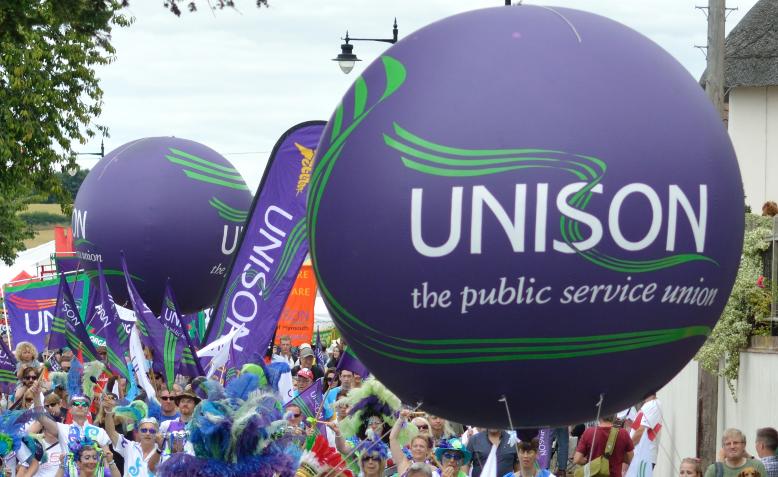 Unison balloon. Photo: Rwendland / Wikimedia Commons / CC BY--SA 4.0, license linked below article
Unison balloon. Photo: Rwendland / Wikimedia Commons / CC BY--SA 4.0, license linked below article
Thirteen more branches have reached the strike threshold, reports Counterfire Unison members
Joining nine other University branches of Unison already with a strike mandate, a further thirteen branches have successfully reached the 50% turnout threshold and majority ‘Yes’ votes to strike over the 2023/24 pay offer.
The University of the West of England, University of Dundee, University of Gloucestershire, Leeds Trinity University, University of Glasgow, University of Brighton, Glasgow School of Art, Solent University, Plymouth Marjon University, Arts University Bournemouth, City University, Glasgow Caledonian University, and University of Chichester all now have a six-month strike window.
Unison tends to represent non-academic staff members at universities, including cleaners, administration and IT staff, some of whom will be amongst the lowest-paid employees at their institutions. This strike window is well-timed potentially to coincide with graduations and open days to which strikes can give a disruptive impression.
For many workers in these types of jobs, striking on days around A-Level clearing, timetabling, induction weeks and the first weeks of term can have a large impact. This will all help add to the pressure over the inadequate 2023-24 pay offer from Senior Management Teams at that their institutions and the University and Colleges Employers Association (UCEA), who impose the pay offers on the workers’ sector wide.
This follows a similar pattern in 2022, with 22 branches striking, which helped boost the pay offer from 3% in 2022 to a minimum of 5% in 2023. Nevertheless with retail-price-index (RPI) inflation at 11.6% in 2022 and projected to be 8.9% in total for 2023, this still represents back-to-back years of substantive real-terms pay cuts, following on from years of inflation outpacing pay offers since 2009.
Higher Education branches in Unison have a disaggregated balloting system, meaning branches are balloted separately so as to try to reach a 50% turnout individually in order to have a victorious ballot. This successfully allows some branches to strike, but also means that those branches under 50% are not able to do so.
With activity in Unison branches in Higher Education generally being in the ascendency in recent years in no small part due to strike activity, there is a hope that the conditions can continue to improve, whereby an aggregated voting system can be bought in and be winnable, so that every branch of the whole union can strike and win together rather than be siloed off.
This phase of the strike wave will see surges like this, and it substantiates the Unison rank-and-file organisation, Time for Real Change’s claims to be shifting the trade-union behemoth away from a service orientation. The holy grail of concerted strike action with the academic union, UCU, remains elusive.
Join Revolution! May Day weekender in London
The world is changing fast. From tariffs and trade wars to the continuing genocide in Gaza to Starmer’s austerity 2.0.
Revolution! on Saturday 3 – Sunday 4 May brings together leading activists and authors to discuss the key questions of the moment and chart a strategy for the left.

